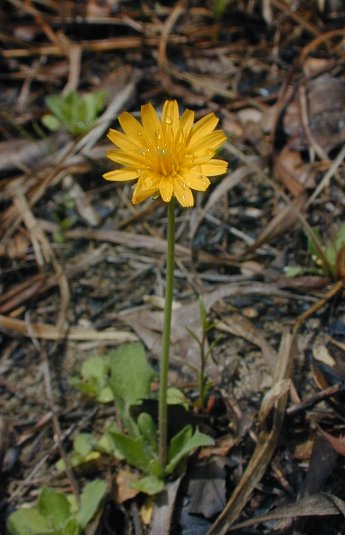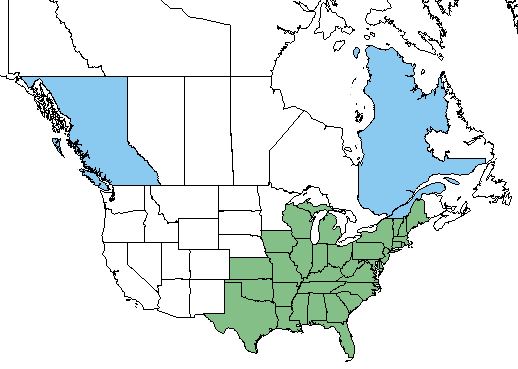Difference between revisions of "Krigia virginica"
Emmazeitler (talk | contribs) |
|||
| Line 43: | Line 43: | ||
<!--==Diseases and parasites==--> | <!--==Diseases and parasites==--> | ||
| − | ==Conservation and | + | ==Conservation, cultivation, and restoration== |
''K. virginica'' is listed as endangered by the Iowa Department of Natural Resources Parks, Recreation, and Preserves Division, as possibly extirpated by the Maine Department of Conservation Natural Areas Program, and as threatened by the Ohio Department of Natural Resources Division of Natural Areas and Preserves.<ref name= "USDA Plant Database"/> | ''K. virginica'' is listed as endangered by the Iowa Department of Natural Resources Parks, Recreation, and Preserves Division, as possibly extirpated by the Maine Department of Conservation Natural Areas Program, and as threatened by the Ohio Department of Natural Resources Division of Natural Areas and Preserves.<ref name= "USDA Plant Database"/> | ||
| − | == | + | ==Cultural use== |
==Photo Gallery== | ==Photo Gallery== | ||
<gallery widths=180px> | <gallery widths=180px> | ||
</gallery> | </gallery> | ||
==References and notes== | ==References and notes== | ||
Revision as of 16:49, 8 June 2021
Common name: Virginia dwarf-dandelion [1]
| Krigia virginica | |
|---|---|

| |
| Photo by the Illinois Wildflowers Database | |
| Scientific classification | |
| Kingdom: | Plantae |
| Division: | Magnoliophyta - Flowering plants |
| Class: | Magnoliopsida - Dicots |
| Order: | Asterales |
| Family: | Asteraceae |
| Genus: | Krigia |
| Species: | K. virginica |
| Binomial name | |
| Krigia virginica L. | |

| |
| Natural range of Krigia virginica from USDA NRCS Plants Database. | |
Contents
Taxonomic Notes
Synonyms: none.[2]
Varieties: none.[2]
Description
K. virginica is an annual forb/herb of the Asteraceae family native to North America and introduced in Canada.[1]
Distribution
K. virginica is found north in Maine, west to Minnesota, south to peninsular Florida, and west to central Texas.[2]
Ecology
Habitat
K. virginica proliferates in rocky woodlands, roadsides, and disturbed areas.[3], as well as sand prairies and savannas, and occasionally sand forests.[4] Specimens have been collected from dry sand, open field in flatwoods, pondbanks, mowed grass verge, loose sands of roadside, open savannah, pine woodland, sandy old field, slash pine desert, and an old railroad bed.[5]
Phenology
K. virginica flowers March through July.[6]
Conservation, cultivation, and restoration
K. virginica is listed as endangered by the Iowa Department of Natural Resources Parks, Recreation, and Preserves Division, as possibly extirpated by the Maine Department of Conservation Natural Areas Program, and as threatened by the Ohio Department of Natural Resources Division of Natural Areas and Preserves.[1]
Cultural use
Photo Gallery
References and notes
- ↑ 1.0 1.1 1.2 USDA Plant Database https://plants.usda.gov/core/profile?symbol=KRVI
- ↑ 2.0 2.1 2.2 Weakley, A.S. 2015. Flora of the southern and mid-atlantic states. Working Draft of 21 May 2015. University of North Carolina at Chapel Hill, Chapel Hill, North Carolina.
- ↑ Weakley, A. S. (2015). Flora of the Southern and Mid-Atlantic States. Chapel Hill, NC, University of North Carolina Herbarium
- ↑ Robertson, K. R., et al. (1997). Delineation of natural communities, a checklist of vascular plants, and new locations for rare plants at the Savanna Army Depot, Carroll and Jo Daviess Counties, Illinois. Champaign-Urbana.
- ↑ URL: http://herbarium.bio.fsu.edu. Last accessed: June 2018. Collectors: Loran C. Anderson, Lisa Keppner, Ed Keppner, Bian Tan, R.K. Godfrey, Gary Knight, Jean Wooten, Brenda Herring, Don Herring, L.B. Trott, Patricia Elliott, Richard S. Mitchell, S. R. Harrison, M. Knott, Grady Reinert, Sidney McDaniel, Andre Clewell, R. Komarek, M. Hopkins, R.A. Norris, Cecil Slaughter. States and counties: Florida ( Wakulla, Taylor, Bay, Columbia, Leon, Franklin, Walton, Jackson, Jefferson, Dixie, Santa Rosa, Marion, Madison, Lafayette, Gadsden, Washington, Putnam, Gulf) Georgia (Coffee, Grady)
- ↑ Nelson, G. PanFlora: Plant data for the eastern United States with emphasis on the Southeastern Coastal Plains, Florida, and the Florida Panhandle. www.gilnelson.com/PanFlora/ Accessed: 22 MAY 2018